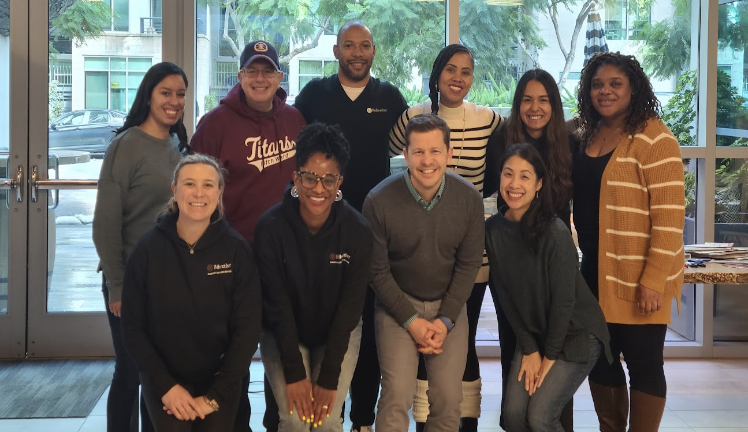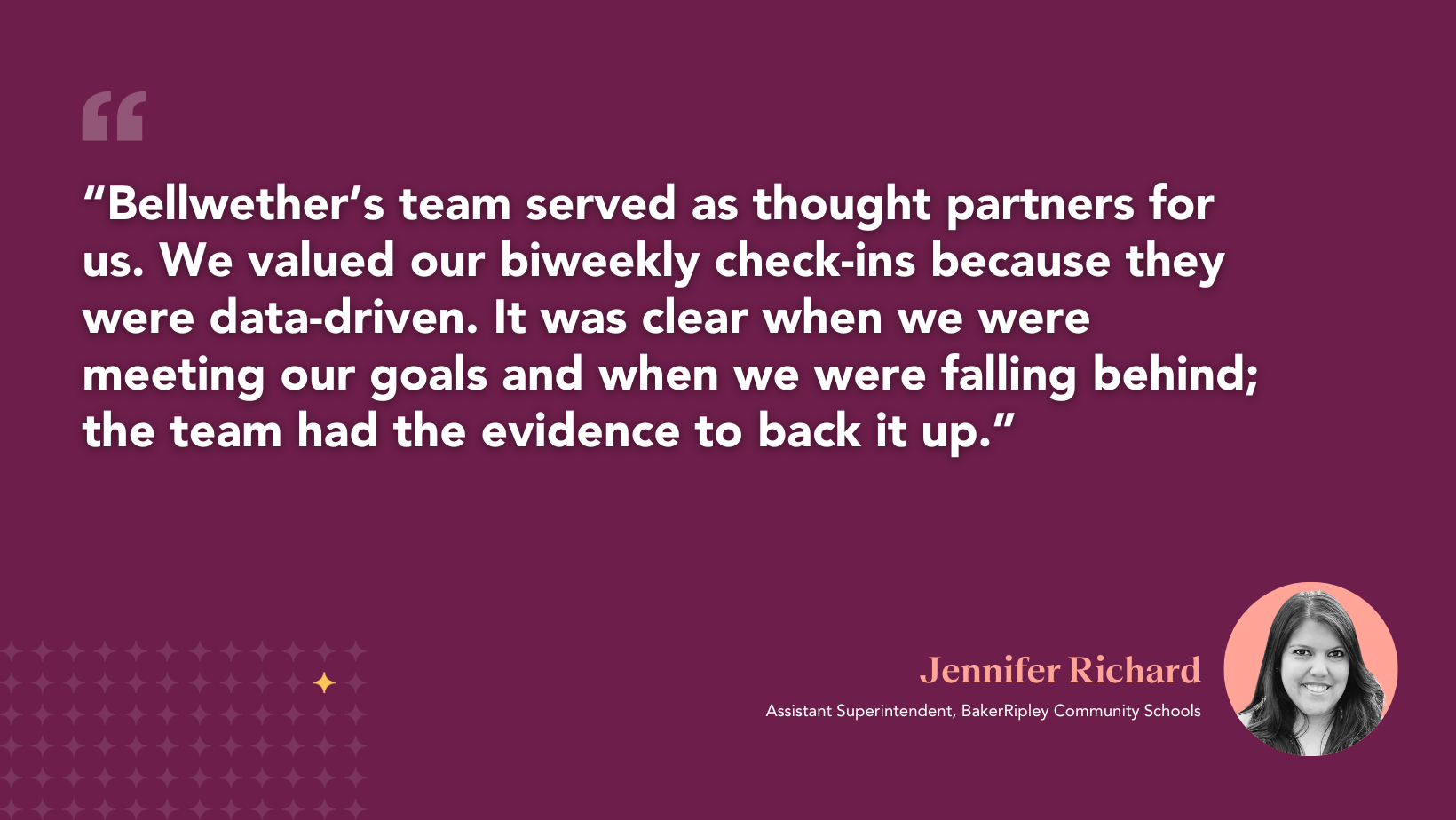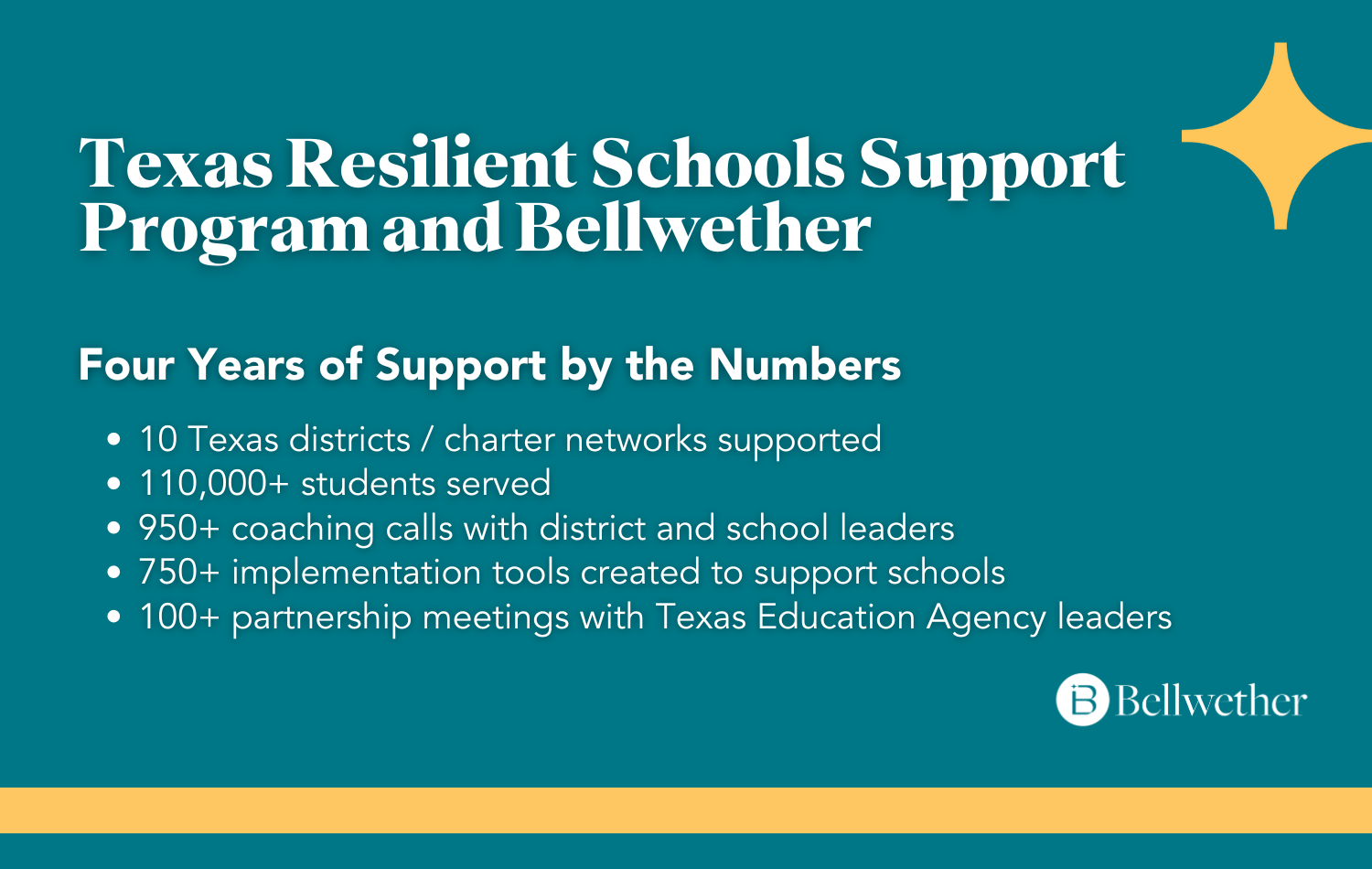When the first schools shuttered in March 2020, the Texas Education Agency (TEA) knew their districts would need support navigating the challenges posed by the COVID-19 outbreak. That support manifested in the Resilient Schools Support Program (RSSP): a robust recovery plan for 180+ districts across the state of Texas affected by pandemic-era school closures. RSSP provided tailored, targeted support to help Texas schools transition to online learning and address student declines in foundational skills and social-emotional learning needs.
Technical Assistance Providers (TAP), including Bellwether, provided pandemic recovery and acceleration plans and continuous implementation assistance to RSSP schools from September 2020 to June 2024. Bellwether’s Academic and Program Strategy (APS) teamlet worked with 10 diverse districts and charter networks across Texas to improve student learning in targeted subgroups and grade levels. Composed of 11 experts, APS has a combined 141 years of experience as teachers, school leaders, and district/charter network leaders, with deep expertise in instructional design, research-based instructional strategies, and implementation.

Each district in the RSSP, paired with a Bellwether APS instructional coach, set a research-based learning acceleration priority; coaches then designed implementation and measurement plans to put those priorities into action to help district leaders and students get back on track post-pandemic.
This is the third in a series on Bellwether’s four-year partnership with the state of Texas through the RSSP. The views below are Bellwether’s only and do not reflect those of the RSSP or an affiliated external agency.
______________________________________________________________________________________________

From 2020 to 2024, Bellwether served as a TAP for BakerRipley Community Schools, a K-8 charter network serving 1,800 students in Houston. Monique Payton, an associate partner in Bellwether’s APS teamlet, served as BakerRipley Community Schools’ RSSP coach, leading the charge to address learning losses across the network.
Payton worked closely with multiple leaders at BakerRipley Community Schools, including Jennifer (Jeni) Richard, the assistant superintendent of teaching and learning. Over the course of four years, Payton, Richard, and their teams planned and implemented learning acceleration strategies to help students and teachers find their footing after the pandemic.
With Payton’s guidance, BakerRipley Community Schools decided to implement High Quality Instructional Materials (HQIM) as its primary learning acceleration strategy, focusing on building teacher capacity to implement materials in classrooms through lesson internalization, lesson rehearsals, and effective data practices. As a result, BakerRipley Community Schools built sustaining systems and sharpened a networkwide instructional vision for what student learning could and should look like.
I sat down with Richard to discuss BakerRipley Community Schools’ long-term partnership with Bellwether and plans for the network’s future.
Emily Shisler: Help us set the stage. What do you love most about BakerRipley Community Schools?
Jeni Richard: The people who work here. Everyone is vision- and values-aligned. Our mission is about true choice for our students, helping set them on the postsecondary path of their choosing. Because we’re a smaller district, we’re able to get to know all of our students and families well. We are a close-knit community.
ES: Tell us about BakerRipley Community Schools’ community model.
JR: Everyone here believes that all students can and will succeed. Part of that success is academic achievement, but we care about supporting the whole child. We may prioritize academics and social-emotional learning, but we also connect our families to resources. We help families who need attorneys or immigration services. We have health clinics on our campuses, as well as credit unions, tax services, and disaster recovery relief programs. We try to support our families in any way we can; we think about Maslow’s Hierarchy of Needs and know that our students must have their basic needs met before they can flourish at school.
ES: What role do you play at BakerRipley Community Schools?
JR: I lead on all things curriculum- and instruction-based. I see social-emotional learning as part of that, because it’s embedded into the curriculum we use. I work with people across the larger organization to ensure our staff are knowledgeable about the resources we provide and how they can request access to them. Nurturing relationships with and between staff members is a huge part of my job, as is making sure that staff support families and students to the best of their abilities.
ES: Can you describe the work BakerRipley Community Schools and Bellwether did together?
JR: Monique Payton had already worked with us on a previous strategic plan, so when she partnered with us again for RSSP, she was easily able to help set and adjust goals for that program to align with our district goals. She already knew our areas of strength and could pick up the work from there.
When it came to addressing learning gaps, we worked with the Bellwether team to make sure that the instructional materials we were implementing as part of HQIM were data-driven. We wanted to make sure we trained our staff well in these new materials, helping them understand exactly what classroom instruction should look like.
After spending the first two years working on implementation with Bellwether’s support, we were then able to shift our focus to systems and procedures. We spent a lot of time on our responses to data, creating clearer protocols for measuring student progress and analyzing student assessments more effectively.
ES: Can you talk more about working with Payton as your TAP?
JR: Bellwether’s team, led by Payton, served as a thought partner for us, checking in on our goals while presenting data analysis to the team, along with suggestions for further improvement. We valued our biweekly check-ins with Payton because they were data-driven: It was clear when we were meeting our goals and when we were falling behind; she had the evidence to back it up.
We also appreciated having her perspective on instruction; she would pick up on things we hadn’t considered or would confirm when we were on the right track. But I think I appreciated the accountability piece the most. Every time we met with Payton, we got one step closer to implementing and executing our plans.
ES: What were the results of the work of RSSP and the impact of Bellwether’s ongoing partnership?
JR: We built such a strong foundation during the RSSP that now, when we are planning for new school years, it feels like we can build on the work we’re already done rather than starting from scratch. With better systems in place to analyze data, we can intervene faster when students are struggling. Just this past summer, campus administrators and teachers remarked that this was the strongest start to a school year they’ve ever had at BakerRipley Community Schools.
In school year 2024-25, we want to support the development of leaders and teachers in looking at student work. We now have a much stronger understanding of how to analyze student data and, ultimately, have the greatest possible impact on our students.
To learn more, read about Bellwether’s advising, planning, and strategy development work.
